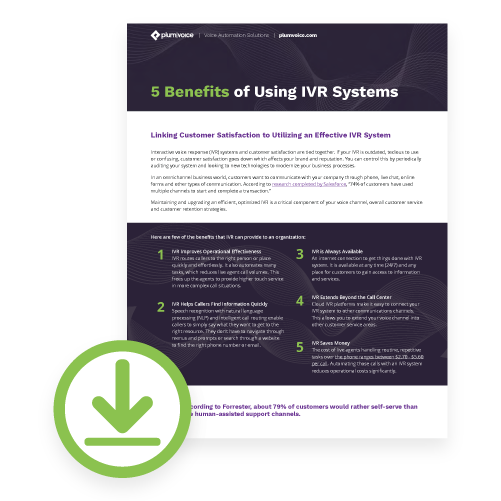What is IVR?
Overview of Interactive Voice Response (IVR) Systems
Interactive Voice Response
Interactive voice response (IVR) is a way to automate an interaction that takes place over the phone. IVR has become a part of daily life. It's typically the first interaction a customer has with a company when they call to get information about an account, order status, shipping details, etc.
IVR allows customers to direct themselves through an automated call routing process to get the information they need quickly and efficiently when it's most convenient to them.
Brief History of IVR
Originally, IVR worked like an automatic switchboard to direct phone calls. It prompted callers to select an option that best fit the reason for their call and then routed them to the appropriate person or call queue. This was a time saver and vast improvement over maneuvering lengthy queues or waiting on long holds for live operators who manually answered and routed calls. Those interactions led to frustrated customers and tarnished brand reputations.
Using IVR as an automated attendant did reduce costs, but it also earned a bad reputation. With complicated and confusing phone tree menu options, which created a labyrinthine of commands to get to the right person, customers got frustrated and hung up. This did little for customer satisfaction.
Today's IVR
Over the years, IVR became a more functional tool as technology advanced. More features became available and created a better solution for a wider range of self-service tasks. IVR systems can now integrate with databases, CRMs and other technologies to automate repetitive processes.
IVR has grown into a more user-friendly technology that uses conversational AI, speech recognition, natural language processing (NLP), automated menus, etc. to help a customer connect to their information faster and easier in a more human-like way without ever talking to a live agent. Yet, if a customer needs extra help or the human touch, they can simply ask for it and be directed to a live agent.
What can IVR do?
An IVR system interacts with a telephone system, similar to how a web browser interacts with the internet, to connect the two systems to share information. Like a web browser, IVR applications can input, request and present dynamic information in real time.
Virtually any task or process that requires numeric, text or speech input may be a opportunity to automate through IVR. This creates an opportunity for businesses to free up their employees' time by directing simple, repetitive tasks to an IVR system.
To get an idea of how companies use and innovate with IVR, please read one of our case studies. You can also check out our recommended best practices to ensure that you are getting the most out of your IVR solution.
Communications Platform as a Service
In today's technology environment, companies no longer have to rely on on-premise PBXs or servers to use IVR. Instead, they have the option of using IVR as part of a cloud-based communications platform.
Communications Platform as a Service (CPaaS) is a cloud-based delivery model that serves as an easy way for developers to improve and integrate direct, real-time communication between users on an existing application, without the need for a separate app.
CPaaS systems are designed to handle a range of communications needs by using APIs to easily integrate different communication channels together. IVR is a central component of many CPaaS models that can drive communications through voice, web, SMS, MMS and social media channels.
Benefits of IVR/ CPaaS
Improved Customer Experience
With an IVR system in place, a business can give self-service options to customers 24/7/365.
Customers also spend less time on the phone because they can get their most frequently asked questions answered faster.
Reduce the average hold time (AHT) associated with waiting for a live agent.
Cost Savings
Automating simple and reduntant tasks or answering repetitive questions with an IVR system costs a fraction of employing live agents.
By utilizing IVRs, live agents can focus on more complex and difficult problems or tasks providing more personalized customer service.
Cloud-based IVR systems eliminate the need to buy and maintain costly, on-premise software.
Flexible Technology
By adopting CPaaS as a cloud-based delivery model, you can use APIs to connect to and integrate with a wide range of external technologies to utilize real time data.
IVR systems are scalable and flexible making it easy for them to quickly adjust to increased or decreased phone traffic.

